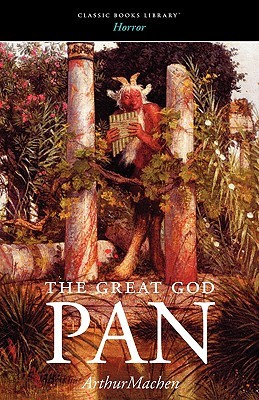
The Great God Pan
by Arthur Machen
Rating: ⭐⭐☆☆☆
Goodreads Link: https://www.goodreads.com/book/show/5712193-the-great-god-pan
Recommended to Stacy by:
Dr. Bartlett, professor of English at UC, Irvine
Recommended for:
Victorian readers
Read from March 11 to 16, 2015 — I own a copy, read count: 2
In September 2008, Steven King sat down to interview himself (strange?). During this interview he got on the topic of of how one of his own short stories was a riff on Arthur Machen's novella, The Great God Pan. King claimed that The Great God Pan was "one of the best horror stories ever written. Maybe the best in the English language. Mine isn’t anywhere near that good..."
I first learned of Arthur Machen's The Great God Pan when working towards my Master's degree in English Literature. I took a class on the fin de siecle (the 1890s), and The Great God Pan was on the reading list. I remember reading it and discussing it, but we had to read so much so fast, that I didn't feel that I really absorbed much at that time. For that reason, and since King praised it so highly, I thought I would re-read it. I remember that my professor said she had chosen it because it was such a controversial text for its time (1894), but I couldn't remember why she said it was so controversial. When I Googled it, Wikipedia described that "On publication it was widely denounced by the press as degenerate and horrific because of its decadent style and sexual content, although it has since garnered a reputation as a classic of horror. Machen’s story was only one of many at the time to focus on Pan as a useful symbol for the power of nature and paganism." So needless to say, I had high expectations. However, I was disappointed.
It's always challenging to read a Victorian text in modern times: our sensibilities are so drastically altered now, and what people found scandalous back then seems commonplace and innocent today. That was what I felt about The Great God Pan. I was expecting Horror (capital H) in the modern sense - a grotesque scary she-monster who was corrupting the lives of others. And while the book does follow the path of Helen Vaughn (a.k.a. Mrs. Herbert, Mrs. Beaumont, Ms. Raymond, etc.), it never actually reveals what she does to corrupt these people. The closest we come to a revelation is when Machen mentions that Helen took Rachel into the forest and something "bad" took place. But we never learn what actually happened in the forest, nor do we learn what Helen did to the boy she scared, or any of her husbands or male friends who later killed themselves from being corrupted by her.
All of the fear directed at Helen is based on rumor and assumption, and this is what bothered me the most. Here is a woman, whose reputation precedes her everywhere she goes, and yet, no one ever gives solid evidence as to what she's done wrong. In fact most people who have met her become completely enamored with her, and it is only after she has left them (e.g. Mr. Herbert) when they begin to slander her as "corrupting them body and soul". There was a strong undertone of sexual nature to the events, yet sex is never directly stated as the reason for this slander against Helen. But lets, for the sake of analysis, assume that what she is doing with these people is sexual. In that case, this becomes yet another example of a male author crafting a text in which sexual women are demonized, in this case literally referred to as a bestial demon who is so impure as to dissolve upon her deathbed. I think the men were corrupted because they were so desperate to get back all the ecstasy that they had with Helen. It is my belief that she blew their minds so profoundly that they all went to extreme, and in some cases deadly, measures to feel the euphoria that they felt with her. But this again is mere assumption because the book purposely cuts off any character who can accurately explain what he/she actually did with Helen.
In the end, I was left unsatisfied and frustrated. Machen had done such a suburb job of building up my curiosity to the brink, yet he never reveals the truth of the situation. I remember ending the book saying, "This can't be all of it! Where's the revelation?"
Maybe if I were a Victorian reader who was so extremely deprived of revelation, this might have been enough. But as a modern reader who lives in a saturated world of full-exposure, where everything is always revealed, sometimes even too much so, this book was a let-down. Two stars for the suspense, but no more than that for the lack of resolution.
No comments:
Post a Comment